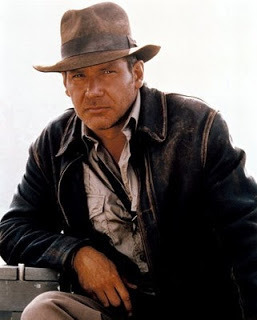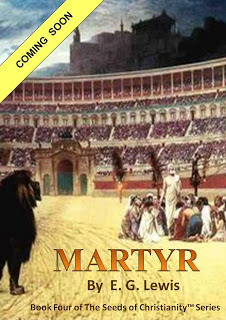CHRISTIAN WRITER'S BLOG CHAIN — QUEST
 Who Goes on a Cool Quest Better than Indiana Jones?Hello My Friend and Welcome.
Who Goes on a Cool Quest Better than Indiana Jones?Hello My Friend and Welcome.Today is our monthly turn in the hot seat of the Christian Writer's Blog Chain. The topic for this month is Quest, and as usual, I'll be looking at it through the lens of writing and the writing life. We authors know all about quests because the fundamental principle of all writing is that there is something the character doesn't have, desperately wants, and intends to get.
The story then details their quest to achieve this elusive goal. Sometimes that goal can be as grandiose as the Holy Grail, Solomon's Lost Mine, or a Ring of unbelievable power. At other times it can less concrete, such as the triumph of good over evil. It can be as mundane as finding a suitable marriage partner or catching the dastardly villain who killed dear old Mrs. McTavish.
It is against this backdrop of an overarching quest that our characters and subplots come to life. It's not unusual to hear an author say something along the lines of, "My characters are doing all sorts of things I never intended." On the surface, such a statement is patently absurd. As authors we are the puppeteer and our characters the marionette. Without us, they remain lifeless dolls, bits of painted wood, fabric and string in a dusty box. They can do nothing until we sit down at the keyboard and pull their strings. It is this Godlike power to bring the inanimate to life and orchestrate its thoughts, desires and actions that makes the creative process so intoxicating. Authors are the ultimate magicians, seemingly creating something out of nothing.
Does this mean the poor author is forced to sit in his gloomy garret tapping out stories while his characters pursue their quest for grand adventures? No. While the characters race around the world chasing villains, retrieving treasures, and rescuing damsels in distress, the author's quest remains closer to home. The author's role, their quest, if you will, is to mine the character and bring them to their fullest expression. Since much of this work occurs on the subconscious level, characters sometimes seem to have a mind of their own.
In truth, our confounded author should have said, "I am amazed at the breadth and depth I've been able to bring to this character. My inner creativity has enlarged them as individuals and increased their contribution to the story beyond anything I imagined when I first created them." Doesn't have quite the same ring as characters rising up off the page and demanding more lines and additional scenes, or else!
Some writing courses encourage participants to create a sheet listing a character's attributes as an aid to character development. Their age, appearance, education, ethnicity, strengths, weaknesses, life goals and so on. This is something I have never done. I find it more applicable to casting a movie than populating a book.
Hollywood has casting professionals whose sole responsibility is to fill the empty slots with believable actors. If someone hired you to cast a movie, the first thing you'd have to know is what kind of a person they're looking for. Being a visual medium, movies demand the actor look the part. Think of the above photo of Harrison Ford as Indiana Jones; imagine Ernest Borgnine in the same role.
Consider also that the first thing a method actor asks is, "What are the character's motivations?" As casting director, you can whip out your character sheet and tell them. Authors never face such a dilemma. Our swashbuckling hero always fits the bill because we designed him that way. Our shy damsel is as pure as driven snow because we said she was. If we'd wanted her to be a vamp, she would have been.
 As I approach the conclusion of my four-book Seeds of Christianity Series, I find myself nostalgically looking back at the various characters who've gone on this quest with me. The ones who had co-starring roles.
As I approach the conclusion of my four-book Seeds of Christianity Series, I find myself nostalgically looking back at the various characters who've gone on this quest with me. The ones who had co-starring roles. Interestingly, only two members of the supporting cast appeared in all four books. They were Rivkah's youngest son, Yudah, and Atticus, the black slave and assistant to Roman Physician, Evodius Scipio, who eventually becomes a Tribune.
Like Atticus, most started small and grew, returning in the following book. Others have come on stage, played their part well, and then left. Rivkah's father, Yaakov, slipped away once she grew up. Eleana, the Christian girl in Disciple who was brutally raped by a Roman soldier and considered, but rejected, an abortion, seemed like someone who would return but didn't
The last book in the Series, Martyr. has two unique characters, Janus, the traitor who exposes his fellow Christians and Rhebekka, the young woman Rivkah's son, Yudah, marries. Rhebekka is a character near and dear to my heart. We gave Yudah a pretty hard time in Apostle, being suspected as a serial killer and all, so he deserved a sweet girl to marry. And he got one.
Earlier I called authors the ultimate magicians, who seemingly create something out of nothing. From the outside it no doubt appears that way. However, those of us on the inside know it isn't that simple. Godlike power brings Godlike responsibilities. Last month we spoke of the need to tell true stories. Our stories can never be true unless, like God, we put a little of ourselves into each of our creations.
On Monday, we'll take a look at the earthquake that destroyed Antioch, the Queen of the East.
Until then, we wish you Peace and Blessings. If you reached this post via a link, click the HOME tab above to see other posts and our archives.
Published on January 19, 2012 01:00
No comments have been added yet.



